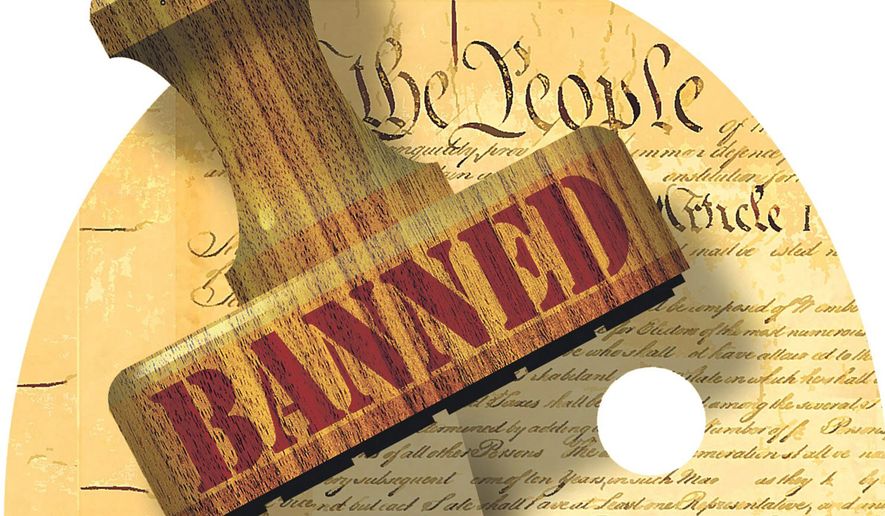OPINION:
What would happen to political speech if the constitutional amendment proposed by Sen. Tom Udall, New Mexico Democrat, actually found its way into the Constitution?
We know what supporters say. This amendment will allow Congress to “control billionaires’ ability to buy elections.” We know what opponents say. As the American Civil Liberties Union put it, the Udall Amendment will “fundamentally ’break’ the Constitution and endanger civil rights and civil liberties for generations.”
We also know the true reason this amendment is being proposed. Senate Democrats are holding a vote because they think it is a winning political issue this election season. Since this is a just political game, we know that the amendment has no chance today of making into the Constitution.
Political winds change, though. What if one day the Udall Amendment became part of our founding document? What would be the real effects?
The most common refrain from supporters of the amendment is that it would “overturn Citizens United.” That’s partially right. This amendment would actually overturn every Supreme Court ruling in the past 40 years that protected our right to criticize and speak out about our elected officials, including Citizens United. But while some on the left have demonized the Citizens United decision as allowing unlimited corporate money, secret money and foreign money into our elections (it does none of these things), the actual facts of the case are that the federal government thought it had the power to ban a political movie.
The government’s position, quite explicitly, is that it was allowed to ban a documentary (“Hillary: The Movie”) from appearing on paid cable TV because it spoke about a politician within 60 days of an election, and the nonprofit conservative group that made the movie (Citizens United) was a corporation. This case could just as readily have been about a Michael Moore documentary released by his production company critical of Republican presidential candidate Mitt Romney in September 2012, or a Paramount political thriller in which the characters mention who they are voting for, released in late October of an election year. The government’s position would remain the same: It could ban the films for mentioning these political candidates.
That is what the Udall Amendment authorizes Congress to do. The explicit effect of “overturning Citizens United” would be to allow the federal government to ban movies that malign (or praise) incumbent politicians and their challengers running for office.
More frightening still are the arguments the government made advocating for this radical position. Deputy Solicitor General, Malcolm L. Stewart was asked during oral arguments in Citizens United to consider a scenario where a single sentence of a 500-page book advocated for a candidate. He responded, “we [the government] could prohibit publication of the book.” That statement caused such a stir that a second round of oral arguments was scheduled, and Elena Kagan, then solicitor general, walked back the book-banning claim. Her new argument, however, found that a “political pamphlet” could be banned. She made no mention of how to distinguish between a political pamphlet and a book.
When supporters argue that this amendment will “overturn Citizens United,” know that these are the facts that they are talking about. This is the power that Congress would actually have, should this alteration to the Constitution ever occur. This is the real effect of the Udall Amendment.
Advocates of the Udall Amendment have said that they have no intention of banning books. Their goal, they argue, is only to keep “evil corporations” from unduly influencing our elections. However, that is absolutely not what the genuine consequence of the constitutional change would be. Citizens United is not the evil villain some Americans picture when they are thinking about “corporate America.” It is a not-for-profit organization funded overwhelmingly by individuals who happen to agree with each other on political issues. It is a group of Americans engaging in the most essential form of democracy — voicing their opinions about challengers, incumbents and the hot-button political arguments of the day.
These are the people this constitutional amendment will silence. It is an amendment to allow Congress to ban any media — film or pamphlet, book or TV ad — produced by individuals who join together specifically to argue their political perspective. Incumbent politicians will get to write the rules governing which Americans can voice their opposition to incumbent politicians.
We may abhor the messages of our political opponents; we may think they are the lowest form of political garbage; we may fight with every breath to dispute their claims, discredit their sources and denounce their content.
However, we should not — even as a political stunt — vote to change the Constitution to give the government the power to ban their political speech.
Scott Blackburn is a research fellow at the Center for Competitive Politics.




Please read our comment policy before commenting.